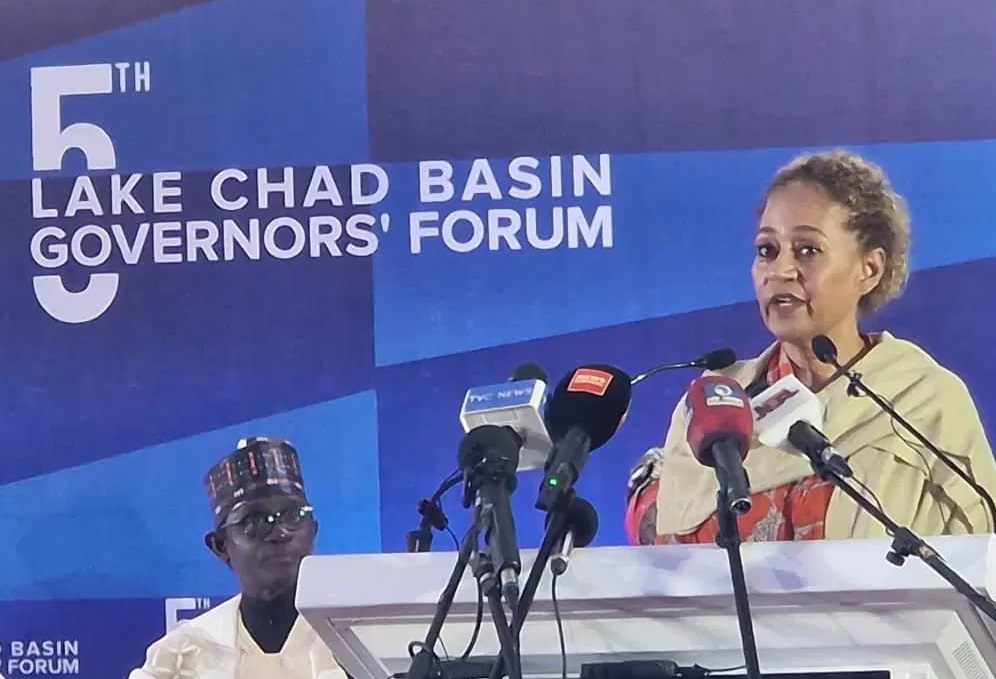News
Military Action Alone Cannot End Terrorism – British Official

Cynthia Rowe, Development Director for the British High Commission in Nigeria has emphasized that military action alone is insufficient in addressing terrorism and violent extremism in the Lake Chad Basin region.
Rowe made the statement during the launch of the Community-Based Reconciliation and Reintegration (CBRR) Policy and Transitional Justice Framework at the 5th Lake Chad Governor’s Forum held on Thursday in Maiduguri.
Speaking at a high-level forum on counterterrorism efforts in Nigeria, Rowe, a representative of the International Support Group, stated the need for a comprehensive, multi-dimensional approach to security challenges that go beyond military action.
“The one thing that we all know is that kinetic action alone is not enough to resolve the challenges around extremism and terrorism that many people are facing,” Rowe said.
“Effective security measures must also address the underlying causes of extremism, through dialogue, justice, and development,” she said.
Rowe emphasized the importance of integrating both local and national systems, engaging traditional leaders, and ensuring that counterterrorism measures uphold the dignity of affected communities.
“Understanding the root causes of extremism and addressing them through dialogue and community based solutions is essential,” she added.
“Reconciliation and community resilience are just as crucial as military action,” she said.
The British official further stressed that crime and insecurity required strategic, accountable, and sustainable solutions.
She pointed to the necessity of practical action, stating, “The final word I would actually give to Madame Wondu, is about action, not paper; and I think that’s what we are all here for in the end,” she noted.
Rowe also spoke about the need for cross border cooperation among the Lake Chad Basin countries, noting the shared challenges of insecurity, displacement, and extremism facing Nigeria, Cameroon, Chad, and Niger.
“It’s fascinating to have our colleagues from Cameroon here who can share insights on what is happening in their country,” Rowe remarked.
“We all have unique experiences but common challenges, and we can learn a lot from one another.”
Reflecting on her previous experience working in Nepal, Rowe spotlighted the importance of collaboration and communication in crisis management.
“The lessons we learned in Nepal about transitional justice and communication are still relevant today.
“The global community is watching Africa, and we are committed to addressing these challenges together.”
She also commended Nigerian officials for their ongoing efforts in engaging with regional stakeholders to find sustainable solutions.
Rowe stressed the need for continued international support and collaboration to rebuild communities and restore peace across the region.
She also expressed gratitude for the contributions of organizations such as the European Union and the UNDP in supporting peace-building efforts.
“The world is watching, and it’s critical that we continue working together to address the root causes of extremism and displacement,” she added.
Earlier, Amb. Mamman Nuhu, the Executive Secretary of the Lake Chad Basin Commission (LCBC), stressed the importance of a harmonized and coherent approach to national and local reintegration efforts in the Lake Chad Basin region.
He noted that the CBRR policy provided guidance to affected countries to support the reintegration process, while recognizing the unique context of each member country.
The executive secretary emphasized the necessity of adopting the policy to local circumstances to ensure its effectiveness.
“The CBRR policy recognizes the importance of community-level reconciliation and traditional justice to sustain reintegration efforts.
He explained, “It also acknowledges that these community-level processes complement nationally-led prosecution strategies and formal mechanisms.”
The Ambassador highlighted that the policy also addressed the trauma and damage caused by conflict in affected communities, with a focus on community readiness and the restoration of social and productive infrastructure.
He pointed out that reconciliation formed the foundation for justice and reintegration support.
“It’s crucial to understand the role communities play in the reintegration process,” Nuhu said.
He explained that the policy aimed to harness the capacities of men, women, youth, children, and different groups within the community to ensure the success of the reintegration efforts.
The CBRR policy also proposes the establishment of community committees to drive the process at the local level, with guidance from a central committee overseeing the entire process.
Nuhu explained that these committees would work in tandem with appropriate regional, national, and local governance structures to ensure the success of reconciliation and reintegration.
News
A Chat with Janet Odio Okolo: A Mother’s Journey Raising a Child with Down Syndrome

News
Hon. Nnamchi Begins Street Lights Deployment In Isi Uzo(Photos)

Honourable Paul Sunday Nnamchi, representing Enugu East/Isi Uzo Federal Constituency in the 10th House of Representatives, has fulfilled his promise to illuminate communities in Isi Uzo Local Government Area.
The lawmaker has just begun the deployment of high-density solar-powered street lights in Ikem Nkwo, marking the beginning of a massive rollout of the street lamps across the communities in Isi Uzo.
This initiative, which started in Enugu East Local Government Area in 2024, aims to support the fight against insecurity in the state which according to him was to add to what Chief Security Officer of Enugu State Barrister Peter Mba had done to secure the state to attracts foreign investments.
The lawmaker expressed concern over banditry attacks, particularly by herdsmen, in some communities within Isi Uzo and Enugu East Local Government Areas in the recent pasts.
He believes that illuminating these areas with high-density street lights would help address the insecurity adding that he was prioritizing border and farming communities in Isi Uzo, where banditry has displaced residents and restricted farming activities.
Communities in Ikem, Eha-Amufu in Isi Uzo which borders Enugu and Benue State and Ugwogo-Nike in Enugu East have been vulnerable to these attacks due to their strategic locations.
News
May Day: Kalu Hails Workers, Applauds Their Role in Nation Building

By Gloria Ikibah
Deputy Speaker of the House of Representatives, Rep. Benjamin Kalu, has extended warm wishes to Nigerian workers as the country marks the 2025 edition of International Workers’ Day.
Kalu praised workers across various sectors for their commitment and resilience, describing them as the engine that keeps the nation moving. He acknowledged their sacrifices and unrelenting drive, especially during tough economic times.
In his message, he highlighted the efforts of the current administration under President Bola Tinubu to improve the welfare of public servants. He referenced the National Assembly’s prompt backing of the new minimum wage as a sign of the government’s seriousness about workers’ wellbeing.
The Deputy Speaker appealed for continued patience and understanding from Nigerians, noting that the ongoing economic reforms, while challenging, are designed to bring long-term relief and prosperity.
Kalu also called for unity, and said the country can only overcome its present difficulties if citizens and leaders work together in good faith.
He therefore urged workers to keep the faith and remain steadfast in their duties, assuring them that brighter days are on the horizon, and wished Nigerian workers a peaceful and fulfilling May Day celebration.
-

 Metro16 hours ago
Metro16 hours agoGunmen storm University of Benin teaching hospital, kill doctor
-

 Metro16 hours ago
Metro16 hours agoFCTA destroys 601 motorbikes over violations
-

 News7 hours ago
News7 hours agoAlleged money laundering: EFCC produces Aisha Achimugu in court
-

 News16 hours ago
News16 hours agoJust in: FG declares tomorrow public holiday
-

 News9 hours ago
News9 hours agoJUST IN: Major General Paul Ufuoma Omu Rtd, dies at 84
-

 News9 hours ago
News9 hours agoTinubu hails Dangote’s World Bank appointment
-

 News12 hours ago
News12 hours agoSAD! Professor’s son takes own life inside varsity staff quarters
-

 News16 hours ago
News16 hours agoFull list: FG approves N110bn to rehabilitate medical schools 18 institutions























